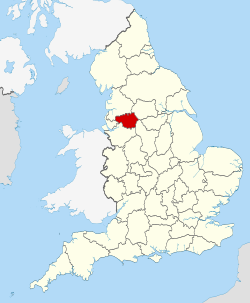 | |
 Map showing Greater Manchester, the executive's area of responsibility | |
| Abbreviation | TfGM |
|---|---|
| Predecessor | Greater Manchester Passenger Transport Executive |
| Formation | 1 April 2011 |
| Type | Public body |
| Purpose | Transport authority |
| Headquarters | 2 Piccadilly Place Manchester M1 3BG |
Region served | Greater Manchester parts of Derbyshire, Cheshire and Lancashire |
Commissioner | Vernon Everitt |
Managing Director | Steve Warrener |
Parent organisation | Greater Manchester Combined Authority (GMCA) |
| Budget | £330.6m |
| Website | www |
Transport for Greater Manchester (TfGM) is a local government body responsible for co-ordinating transport services throughout Greater Manchester in North West England. It is an executive arm of the Greater Manchester Combined Authority (GMCA), the city region's administrative authority. The strategies and policies of Transport for Greater Manchester are set by the GMCA and its Greater Manchester Transport Committee (GMTC). The committee is made up of 33 councillors appointed from the ten Greater Manchester boroughs (Bolton, Bury, Manchester, Oldham, Rochdale, Salford, Stockport, Tameside, Trafford and Wigan), as well as the Mayor of Greater Manchester.[1]
TfGM owns Metrolink – the United Kingdom’s largest light rail network – which is operated and maintained under contract by a Keolis/Amey consortium.[2][3] TfGM also owns Greater Manchester's Cycle Hire scheme, and is responsible for cycling and walking infrastructure. TfGM owns and maintains bus stations, stops & shelters, however bus services are deregulated in Great Britain outside London. Following the passing of the Bus Services Act 2017, Greater Manchester became the first city-region to start the process of bus franchising, returning bus services to public control.[4][5] TfGM does not control National Rail services or infrastructure in Greater Manchester.
TfGM is responsible for developing the Bee Network, an integrated transport network for Greater Manchester. The Bee Network is proposed to include a single transport livery, integrated fares & ticketing, and a fare cap across tram, bus, cycling, walking, and eventually suburban rail. In January 2025, all Metrolink trams and franchised buses services were integrated, along with cycle hiring services.[6] Negotiations with central government have led to the agreement that eight commuter lines across Greater Manchester and North Derbyshire will be progressively transferred to TfGM control of fare and service specification between December 2026 and December 2028 with the introduction of multi-modal fare caps with tram and bus, tap and go ticketing, and 64 rail stations refurbished and branded Bee Network. The remaining 32 stations across Greater Manchester lying on other rail lines will then follow by 2030.[7]
- ^ "New Greater Manchester Transport Committee meets for the first time". tfgm.com. Transport for Greater Manchester. 6 August 2019. Archived from the original on 19 February 2022. Retrieved 19 February 2022.
- ^ "Salford Infrastructure Delivery Plan" (PDF). Salford City Council. February 2012. Archived from the original (PDF) on 20 May 2013. Retrieved 22 January 2013.
- ^ "RATP buys Manchester Metrolink operator". Railway Gazette International. London. 2 August 2011. Archived from the original on 17 September 2011. Retrieved 2 August 2011.
- ^ Burnham, Andy (13 December 2017). Mayor sets out major transport overhaul (Speech). Urban Transport Group. Leeds. Retrieved 12 December 2021.
- ^ "Greater Manchester appoints first bus operators for new system". BBC News. 23 December 2022. Retrieved 30 December 2022.
- ^ "Details of the first buses under public control in Greater Manchester revealed". Manchester Evening News. 23 December 2022. Retrieved 30 December 2022.
- ^ https://news.tfgm.com/press-releases/7f9d4151-b911-4247-97d0-cc5d5a9570a3/mayor-andy-burnham-reveals-plans-for-bee-network-rail-to-boost-passenger-numbers-and-drive-greater-manchester-s-growth
© MMXXIII Rich X Search. We shall prevail. All rights reserved. Rich X Search
